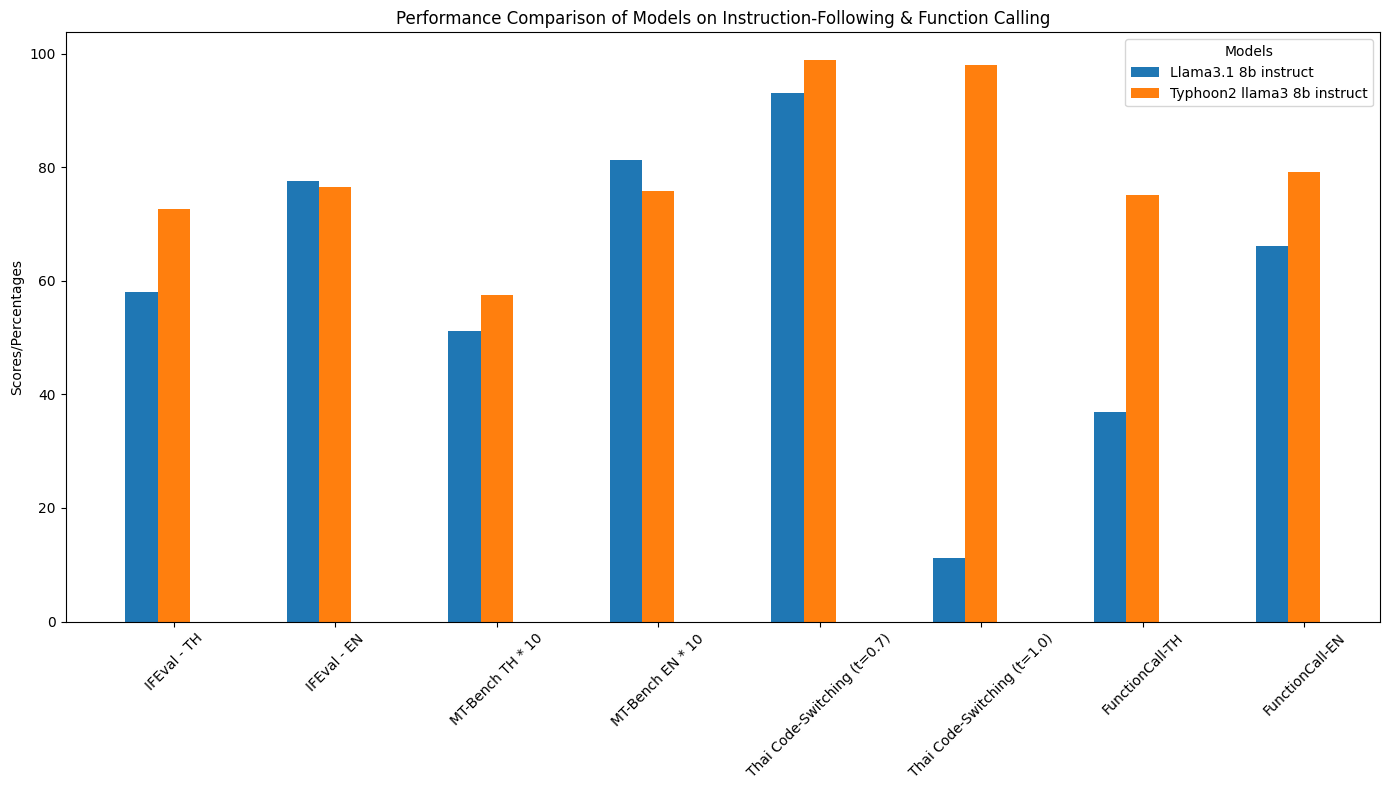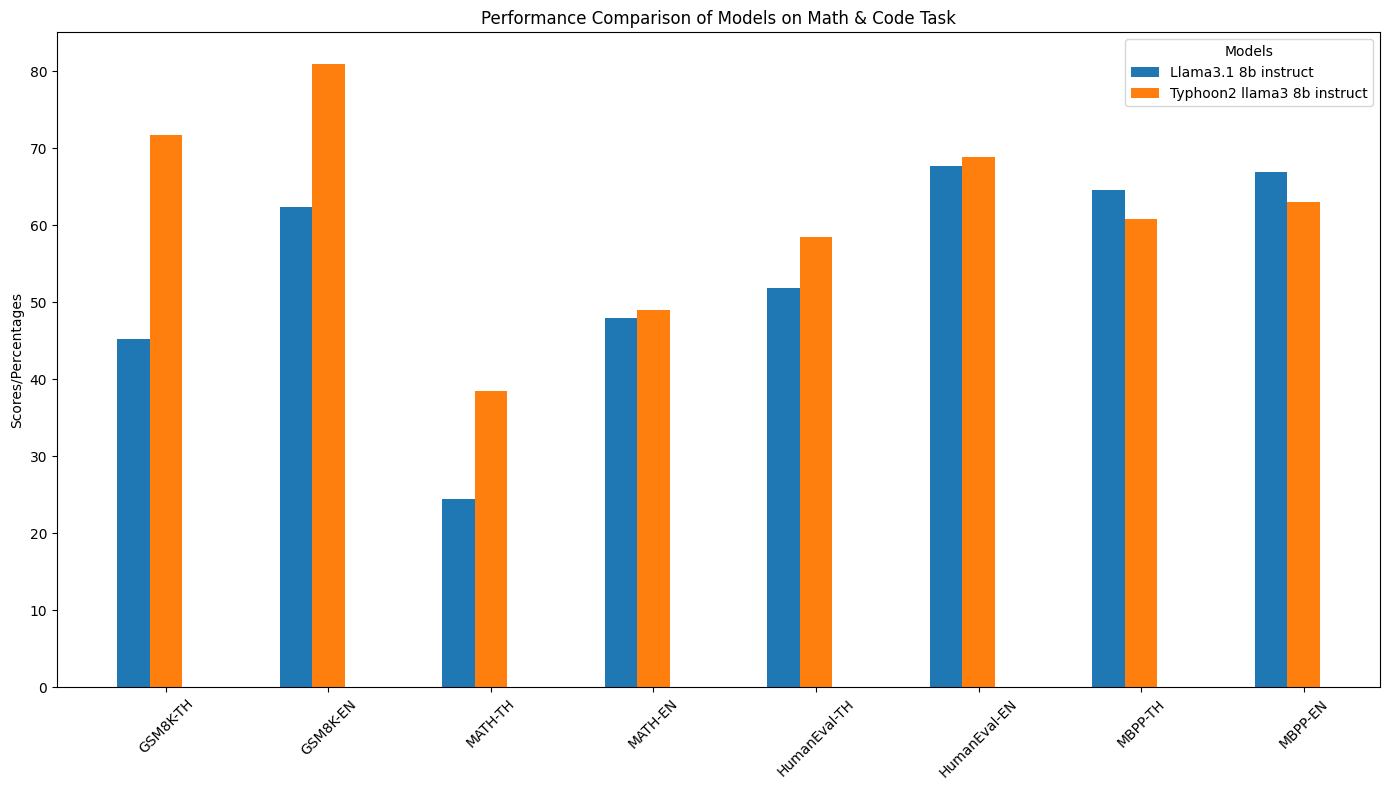Llama3.1 Typhoon2 8b Instruct
Model Overview
Model Features
Model Capabilities
Use Cases
🚀 Llama3.1-Typhoon2-8B
Llama3.1-Typhoon2-8B is a Thai large language model (Instruct) with 8 billion parameters, based on Llama3.1-8B. It offers high performance in various tasks such as instruction - following, function calls, and specific domains like math and coding.
🚀 Quick Start
To quickly start using the Llama3.1-Typhoon2-8B model, you need to have transformers 4.45.0 or newer installed. Here is a simple example to load the model:
from transformers import AutoTokenizer, AutoModelForCausalLM
import torch
model_id = "scb10x/llama3.1-typhoon2-8b-instruct"
tokenizer = AutoTokenizer.from_pretrained(model_id)
model = AutoModelForCausalLM.from_pretrained(
model_id,
torch_dtype=torch.bfloat16,
device_map="auto",
)
✨ Features
Instruction - Following & Function Call Performance
The model shows excellent performance in following instructions and making function calls. You can see the general performance in the following image:

Specific Domain Performance (Math & Coding)
In specific domains like math and coding, the model also performs well. The relevant performance image is as follows:

Long Context Performance
The model can handle long - context tasks effectively. Check out the long - context performance image:

Detail Performance
The following table shows the detailed performance comparison between different models:
| Model | IFEval - TH | IFEval - EN | MT - Bench TH | MT - Bench EN | Thai Code - Switching(t = 0.7) | Thai Code - Switching(t = 1.0) | FunctionCall - TH | FunctionCall - EN | GSM8K - TH | GSM8K - EN | MATH - TH | MATH - EN | HumanEval - TH | HumanEval - EN | MBPP - TH | MBPP - EN |
|---|---|---|---|---|---|---|---|---|---|---|---|---|---|---|---|---|
| Llama3.1 8B Instruct | 58.04% | 77.64% | 5.109 | 8.118 | 93% | 11.2% | 36.92% | 66.06% | 45.18% | 62.4% | 24.42% | 48% | 51.8% | 67.7% | 64.6% | 66.9% |
| Typhoon2 Llama3 8B Instruct | 72.60% | 76.43% | 5.7417 | 7.584 | 98.8% | 98% | 75.12% | 79.08% | 71.72% | 81.0% | 38.48% | 49.04% | 58.5% | 68.9% | 60.8% | 63.0% |
📦 Installation
To use the model, you need to install the transformers library with version 4.45.0 or newer. You can install it using pip:
pip install transformers>=4.45.0
💻 Usage Examples
Basic Usage
from transformers import AutoTokenizer, AutoModelForCausalLM
import torch
model_id = "scb10x/llama3.1-typhoon2-8b-instruct"
tokenizer = AutoTokenizer.from_pretrained(model_id)
model = AutoModelForCausalLM.from_pretrained(
model_id,
torch_dtype=torch.bfloat16,
device_map="auto",
)
messages = [
{"role": "system", "content": "You are a male AI assistant named Typhoon created by SCB 10X to be helpful, harmless, and honest. Typhoon is happy to help with analysis, question answering, math, coding, creative writing, teaching, role - play, general discussion, and all sorts of other tasks. Typhoon responds directly to all human messages without unnecessary affirmations or filler phrases like “Certainly!”, “Of course!”, “Absolutely!”, “Great!”, “Sure!”, etc. Specifically, Typhoon avoids starting responses with the word “Certainly” in any way. Typhoon follows this information in all languages, and always responds to the user in the language they use or request. Typhoon is now being connected with a human. Write in fluid, conversational prose, Show genuine interest in understanding requests, Express appropriate emotions and empathy. Also showing information in term that is easy to understand and visualized."},
{"role": "user", "content": "ขอสูตรไก่ย่าง"},
]
input_ids = tokenizer.apply_chat_template(
messages,
add_generation_prompt=True,
return_tensors="pt"
).to(model.device)
terminators = [
tokenizer.eos_token_id,
tokenizer.convert_tokens_to_ids("<|eot_id|>")
]
outputs = model.generate(
input_ids,
max_new_tokens=512,
eos_token_id=terminators,
do_sample=True,
temperature=0.7,
top_p=0.95,
)
response = outputs[0][input_ids.shape[-1]:]
print(tokenizer.decode(response, skip_special_tokens=True))
Advanced Usage
Inference Server Hosting Example
pip install vllm
vllm serve scb10x/llama3.1-typhoon2-8b-instruct
# see more information at https://docs.vllm.ai/
Function - Call Example
import torch
from transformers import AutoModelForCausalLM, AutoTokenizer
import ast
model_name = "scb10x/llama3.1-typhoon2-8b-instruct"
tokenizer = AutoTokenizer.from_pretrained(model_name)
model = AutoModelForCausalLM.from_pretrained(
model_name, torch_dtype=torch.bfloat16, device_map='auto'
)
get_weather_api = {
"name": "get_weather",
"description": "Get the current weather for a location",
"parameters": {
"type": "object",
"properties": {
"location": {
"type": "string",
"description": "The city and state, e.g. San Francisco, New York",
},
"unit": {
"type": "string",
"enum": ["celsius", "fahrenheit"],
"description": "The unit of temperature to return",
},
},
"required": ["location"],
},
}
search_api = {
"name": "search",
"description": "Search for information on the internet",
"parameters": {
"type": "object",
"properties": {
"query": {
"type": "string",
"description": "The search query, e.g. 'latest news on AI'",
}
},
"required": ["query"],
},
}
get_stock = {
"name": "get_stock_price",
"description": "Get the stock price",
"parameters": {
"type": "object",
"properties": {
"symbol": {
"type": "string",
"description": "The stock symbol, e.g. AAPL, GOOG",
}
},
"required": ["symbol"],
},
}
# Tool input are same format with OpenAI tools
openai_format_tools = [get_weather_api, search_api, get_stock]
messages = [
{"role": "system", "content": "You are an expert in composing functions."},
{"role": "user", "content": "ขอราคาหุ้น Tasla (TLS) และ Amazon (AMZ) ?"},
]
inputs = tokenizer.apply_chat_template(
messages, tools=openai_format_tools, add_generation_prompt=True, return_tensors="pt"
).to(model.device)
outputs = model.generate(
inputs,
max_new_tokens=512,
do_sample=True,
temperature=0.7,
num_return_sequences=1,
eos_token_id=[tokenizer.eos_token_id, 128009],
)
response = outputs[0][inputs.shape[-1]:]
print("Here Output:", tokenizer.decode(response, skip_special_tokens=True))
# Decoding function utility
def resolve_ast_by_type(value):
if isinstance(value, ast.Constant):
if value.value is Ellipsis:
output = "..."
else:
output = value.value
elif isinstance(value, ast.UnaryOp):
output = -value.operand.value
elif isinstance(value, ast.List):
output = [resolve_ast_by_type(v) for v in value.elts]
elif isinstance(value, ast.Dict):
output = {
resolve_ast_by_type(k): resolve_ast_by_type(v)
for k, v in zip(value.keys, value.values)
}
elif isinstance(
value, ast.NameConstant
): # Added this condition to handle boolean values
output = value.value
elif isinstance(
value, ast.BinOp
): # Added this condition to handle function calls as arguments
output = eval(ast.unparse(value))
elif isinstance(value, ast.Name):
output = value.id
elif isinstance(value, ast.Call):
if len(value.keywords) == 0:
output = ast.unparse(value)
else:
output = resolve_ast_call(value)
elif isinstance(value, ast.Tuple):
output = tuple(resolve_ast_by_type(v) for v in value.elts)
elif isinstance(value, ast.Lambda):
output = eval(ast.unparse(value.body[0].value))
elif isinstance(value, ast.Ellipsis):
output = "..."
elif isinstance(value, ast.Subscript):
try:
output = ast.unparse(value.body[0].value)
except:
output = ast.unparse(value.value) + "[" + ast.unparse(value.slice) + "]"
else:
raise Exception(f"Unsupported AST type: {type(value)}")
return output
def resolve_ast_call(elem):
func_parts = []
func_part = elem.func
while isinstance(func_part, ast.Attribute):
func_parts.append(func_part.attr)
func_part = func_part.value
if isinstance(func_part, ast.Name):
func_parts.append(func_part.id)
func_name = ".".join(reversed(func_parts))
args_dict = {}
for arg in elem.keywords:
output = resolve_ast_by_type(arg.value)
args_dict[arg.arg] = output
return {func_name: args_dict}
def ast_parse(input_str, language="Python"):
if language == "Python":
cleaned_input = input_str.strip("[]'")
parsed = ast.parse(cleaned_input, mode="eval")
extracted = []
if isinstance(parsed.body, ast.Call):
extracted.append(resolve_ast_call(parsed.body))
else:
for elem in parsed.body.elts:
assert isinstance(elem, ast.Call)
extracted.append(resolve_ast_call(elem))
return extracted
else:
raise NotImplementedError(f"Unsupported language: {language}")
def parse_nested_value(value):
"""
Parse a potentially nested value from the AST output.
Args:
value: The value to parse, which could be a nested dictionary, which includes another function call, or a simple value.
Returns:
str: A string representation of the value, handling nested function calls and nested dictionary function arguments.
"""
if isinstance(value, dict):
# Check if the dictionary represents a function call (i.e., the value is another dictionary or complex structure)
if all(isinstance(v, dict) for v in value.values()):
func_name = list(value.keys())[0]
args = value[func_name]
args_str = ", ".join(
f"{k}={parse_nested_value(v)}" for k, v in args.items()
)
return f"{func_name}({args_str})"
else:
# If it's a simple dictionary, treat it as key - value pairs
return (
"{"
+ ", ".join(f"'{k}': {parse_nested_value(v)}" for k, v in value.items())
+ "}"
)
return repr(value)
def default_decode_ast_prompting(result, language="Python"):
result = result.strip("`\n ")
if not result.startswith("["):
result = "[" + result
if not result.endswith("]"):
result = result + "]"
decoded_output = ast_parse(result, language)
return decoded_output
fc_result = default_decode_ast_prompting(tokenizer.decode(response, skip_special_tokens=True))
print(fc_result) # [{'Function': {'arguments': '{"symbol": "TLS"}', 'name': 'get_stock_price'}}, {'Function': {'arguments': '{"symbol": "AMZ"}', 'name': 'get_stock_price'}}]
📚 Documentation
Model Description
| Property | Details |
|---|---|
| Model Type | A 8B instruct decoder - only model based on Llama architecture. |
| Training Data | Not specified in the original document. |
| Requirement | transformers 4.45.0 or newer. |
| Context length | 90k |
| Primary Language(s) | Thai and English |
| License | [Llama 3.1 Community License](https://github.com/meta - llama/llama - models/blob/main/models/llama3_1/LICENSE) |
Intended Uses & Limitations
This model is an instructional model. However, it's still undergoing development. It incorporates some level of guardrails, but it still may produce answers that are inaccurate, biased, or otherwise objectionable in response to user prompts. We recommend that developers assess these risks in the context of their use case.
Follow us
You can follow us on Twitter: https://twitter.com/opentyphoon
Support
Join our Discord community for support: https://discord.gg/us5gAYmrxw
Citation
If you find Typhoon2 useful for your work, please cite it using:
@misc{typhoon2,
title={Typhoon 2: A Family of Open Text and Multimodal Thai Large Language Models},
author={Kunat Pipatanakul and Potsawee Manakul and Natapong Nitarach and Warit Sirichotedumrong and Surapon Nonesung and Teetouch Jaknamon and Parinthapat Pengpun and Pittawat Taveekitworachai and Adisai Na - Thalang and Sittipong Sripaisarnmongkol and Krisanapong Jirayoot and Kasima Tharnpipitchai},
year={2024},
eprint={2412.13702},
archivePrefix={arXiv},
primaryClass={cs.CL},
url={https://arxiv.org/abs/2412.13702},
}
⚠️ Important Note
This model is still under development and may produce inaccurate, biased, or otherwise objectionable answers. Developers should assess the risks according to their use cases.
💡 Usage Tip
Make sure to install the
transformerslibrary with version 4.45.0 or newer before using the model. For inference server hosting, refer to the official documentation ofvllmat https://docs.vllm.ai/.
 Transformers
Transformers Transformers Supports Multiple Languages
Transformers Supports Multiple Languages